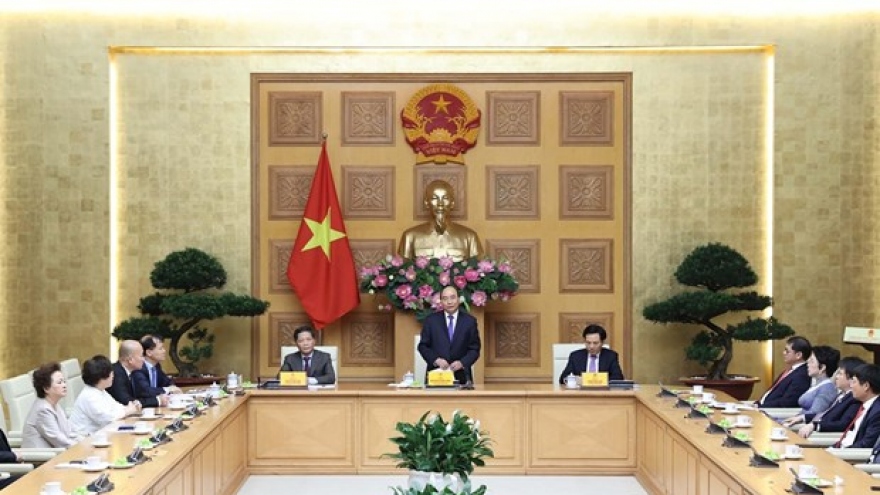Vietnam needs policies to develop national enterprises
Completing legal policies to support the development of national enterprises in Vietnam is not only an urgent task, but a decisive factor in achieving industrialisation and modernisation.

These enterprises play a key role in innovating the economic growth model, enhancing the value of the Vietnamese brand, and promoting the participation of Vietnamese businesses in the global value chain.
However, Vietnam still lacks a clear definition of what constitutes a national enterprise, leading to varied interpretations.
Some said that national enterprises should be large state-owned corporations such as Vietnam Airlines, Vietnam Oil and Gas Group, Vietnam Electricity, Posts and Telecommunications, Vietnam Petroleum, MobiFone, and Vinachem.
Others believe that national enterprises should include large corporations across all economic sectors, not just state-owned entities. Examples include private corporations that are strong in both domestic and global markets, such as Vingroup, Sungroup, Hoa Phat, Sunhouse, and Tan A Dai Thanh.
There are also views that medium-sized enterprises or businesses trading in domestic products could qualify as national enterprises, provided they meet sector-specific criteria.
The criteria for national enterprises could include standards for capital and market scale, with these enterprises expected to be leaders in their industries, possessing significant potential and adhering to international standards.
At present, Vietnam does not have a comprehensive definition of national enterprises, nor are there legal documents stipulating preferential policies on taxes, capital access, or markets for these businesses.
This lack of clarity has resulted in the absence of specific mechanisms and policies to support enterprises facing difficulties or requiring substantial resources to meet international standards.
It is necessary for the Government to make breakthrough policies to turn these enterprises into pillars of the national economy, experts have suggested.
Nguyen Si Dung, PhD, former deputy chief of the National Assembly Office, emphasised the importance of enabling national enterprises to access capital at preferential interest rates, particularly in key sectors such as high technology, renewable energy, and high-tech agriculture.
He said that administrative reforms and legal support were essential to reducing barriers and creating a more favourable business environment for domestic enterprises.
Mechanisms should also be established to encourage linkages between small- and medium-sized enterprises (SMEs) and large enterprises, fostering a sustainable business ecosystem.
Additionally, Dung said, efforts should focus on training high-quality human resources and supporting enterprises in accessing and applying advanced technologies. The State should enable businesses to innovate and develop high-value products.
Nguyen Xuan Phu, Chairman of the Sunhouse Group, said that developing national enterprises would require a system of breakthrough policies. These should cover areas such as building national brands, improving workforce quality, promoting technology transfer, and providing financial support for sustainable development.
He proposed making solutions to remove existing barriers, thereby creating better conditions for national enterprises to grow and integrate internationally. Defining national enterprises in legal documents should be the first step, forming the foundation for implementing targeted support policies.
Financial incentives for national enterprises should include investment support funds, credit incentives, and tax reductions, Phú noted.
The State should also encourage SMEs to expand, providing conditions for them to become national enterprises.
Legal policies should promote innovation, supporting enterprises in accessing advanced technologies, implementing digital transformation, and developing high-value products. Enterprises would also require protection and support in international trade disputes.
Building a national brand for these enterprises would be equally important. The Government should carry out programmes to promote and protect products with Vietnamese identity in global markets and support enterprises in participating in international trade exhibitions.
Vietnam, Dung added, could draw lessons from Japan’s keiretsu model and the Republic of Korea’s chaebols, such as Samsung and Hyundai, to develop leading national enterprises. These would serve as core entities linking SMEs to global value chains.
According to the Vietnam Chamber of Commerce and Industry, from the launch of Doi moi (Renewal) in 1986 until 2023, Vietnam has had over 900,000 enterprises, including around 20,000 cooperatives and more than 5 million business households.
Vietnamese enterprises and entrepreneurs have established their brand value in regional and global markets.
The country boasts many large enterprises that play a pioneering role in sectoral and economic development, including Viettel, PVN, Vingroup, FPT, THACO, Hoa Phat, TH, Vinamilk, and Masan. These enterprises have significantly enhanced the value of the national brand in the global market.
Many Vietnamese businesses have embraced technology and created ecosystems that support SME development. They have also been at the forefront of green and digital transformation.
Thanks to their contributions, Vietnam's economy has transformed from an agricultural to an industrial one.

